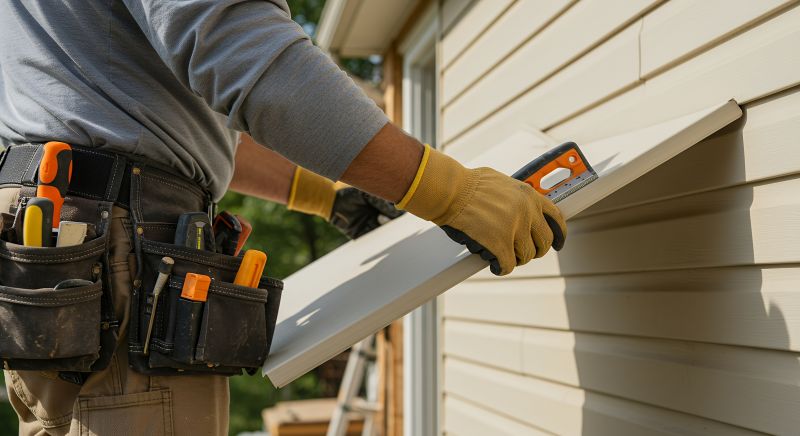Favorite Products For Siding Service Maintenance
Identify the most reliable and versatile products to keep siding looking great and functioning properly over time.
 Selecting the right products for siding service is essential to ensure a durable and visually appealing exterior for any property. In Saint Cloud, MN, where weather conditions can vary, choosing quality siding products can help protect buildings from moisture, wind, and temperature fluctuations. From installation tools to protective coatings, a comprehensive selection of products can facilitate efficient and effective siding projects.
Selecting the right products for siding service is essential to ensure a durable and visually appealing exterior for any property. In Saint Cloud, MN, where weather conditions can vary, choosing quality siding products can help protect buildings from moisture, wind, and temperature fluctuations. From installation tools to protective coatings, a comprehensive selection of products can facilitate efficient and effective siding projects.
Top Overall Option
High-Quality Siding Panel System
A versatile siding panel system designed for durability and ease of installation, suitable for a variety of building styles and climates. It offers excellent resistance to weathering and can be customized with different textures and finishes to match aesthetic preferences.
Types of Products For Siding Service
Vinyl Siding Panels
Popular for their affordability and low maintenance, vinyl siding panels come in a wide range of colors and styles, making them a common choice for residential projects.
Fiber Cement Siding
Known for its strength and resistance to pests and fire, fiber cement siding provides a durable option with a natural appearance.
Wood Siding Boards
Offering a classic look, wood siding requires proper treatment and maintenance but can add warmth and character to any building.
Aluminum Siding
Lightweight and resistant to corrosion, aluminum siding is often used for its ease of installation and longevity.
Insulated Siding Panels
These panels combine siding with insulation to improve energy efficiency and reduce heating and cooling costs.
Metal Siding Sheets
Suitable for industrial or modern designs, metal siding sheets are durable and available in various finishes.
Stucco Siding
A traditional exterior finish that provides texture and weather resistance, often used in combination with other siding types.
Brick Veneer Siding
Provides the appearance of brick with easier installation and less weight, suitable for aesthetic enhancements.
Composite Siding
Made from a mixture of materials, composite siding offers versatility and resistance to environmental factors.
PVC Siding
A type of vinyl siding that is highly resistant to moisture and pests, with a smooth finish.
Stone Veneer Siding
Creates a natural stone look with lightweight panels that are easier to install than traditional stone.
Rubber Siding
Flexible and impact-resistant, rubber siding can be used for specialized applications or accents.
Popular Choices
Widely used for its affordability and low maintenance, vinyl siding remains a common choice for many projects.
Chosen for its durability and appearance, fiber cement siding is favored in regions with variable weather.
Offering a natural aesthetic, wood siding is popular for traditional and rustic styles.
Known for its lightweight nature and resistance to corrosion, aluminum siding is frequently selected for its longevity.
Combining insulation with siding, this option enhances energy efficiency and curb appeal.
Modern and durable, metal panels are trending for contemporary architectural designs.
Aesthetic and weather-resistant, stucco remains a popular exterior finish in many regions.
Provides a classic look with easier installation compared to full brick walls.
Versatile and low-maintenance, composite siding is gaining popularity for its durability.
Resistant to moisture and pests, PVC siding is a trending material for exterior cladding.
Offers a natural stone appearance with lightweight panels suitable for various architectural styles.
The process of siding installation or repair often involves multiple product types, each serving a specific purpose. Proper preparation, material selection, and finishing are key to achieving long-lasting results. Whether working on residential or commercial buildings, understanding the variety of available siding products can help contractors and homeowners make informed decisions that align with their project goals.
Investing in reliable siding materials and accessories can also simplify maintenance and improve the overall appearance of the structure. While the market offers numerous options, focusing on high-quality, versatile products suited for the local climate can contribute to better performance over time. It's important to consider factors such as material compatibility, ease of installation, and resistance to environmental stressors when selecting products for siding projects.
In Saint Cloud, MN, where seasonal changes are prominent, choosing products that withstand temperature variations and moisture exposure is especially relevant. Properly selected siding products not only enhance curb appeal but also provide essential protection for the building envelope. Consulting with local suppliers or siding specialists can further assist in identifying the most suitable products for specific project needs.
Key Buying Considerations
- Climate suitability: Choose products designed to withstand local weather conditions such as snow, rain, and temperature fluctuations.
- Material durability: Consider the longevity and resistance to pests, rot, and corrosion.
- Maintenance requirements: Evaluate how much upkeep is needed to keep the siding looking its best.
- Installation complexity: Some products may require professional installation, impacting project timelines and costs.
- Aesthetic options: Select finishes, textures, and colors that complement the building's style and surroundings.
- Energy efficiency: Insulated siding options can contribute to better thermal performance.
- Cost and budget: Balance quality and affordability to find a product that fits your financial plan.
- Environmental resistance: Resistance to moisture, UV rays, and impact can influence product performance.
- Compatibility with existing structures: Ensure the new siding can be properly installed over or alongside existing materials.
- Local building codes: Verify that selected products meet regional regulations and standards.
- Warranty and support: Look for products with reliable manufacturer warranties and customer support.
- Environmental exposure: Consider factors like wind load, hail, and pollution when selecting materials.
- Weight and handling: Lighter materials may ease installation but should meet durability requirements.
- Availability and supply chain: Ensure the products are readily available through local suppliers.
